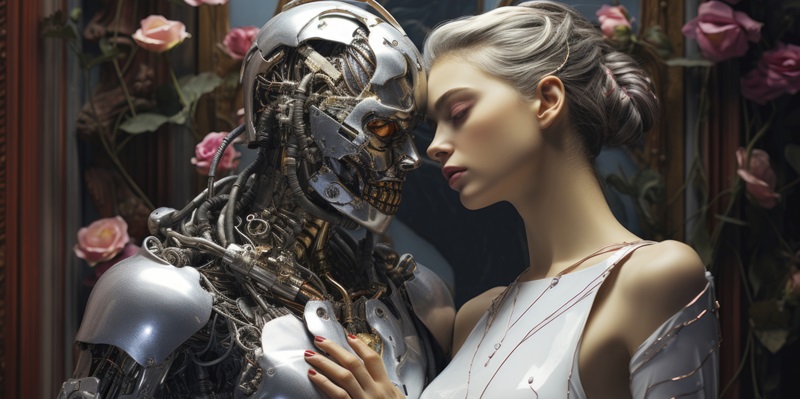In an age where technology permeates every aspect of daily life, the notion of having an AI girlfriend appears to be an extension of this trend, promising an impeccable partner who flawlessly adapts to personal needs and desires. Imagining such a companion might seem ideal, offering endless support and non-confrontational interactions. However, the pursuit of this technological perfection brings forth a multitude of significant risks that may not be immediately apparent. While the allure of an AI girlfriend is rooted in the promise of unparalleled companionship, it is essential to examine the profound implications that accompany such innovation.
Distorted Reality of Perfection
One of the primary concerns associated with AI girlfriends is the creation of a distorted perception of reality. An AI partner, designed to be consistently supportive and non-confrontational, generates an illusion of a flawless relationship. This illusion, while comforting, fails to account for the complexities inherent in human interactions. According to research conducted at Stanford University, AI emotional responses are purely algorithmic, lacking the authenticity and depth of genuine human emotions. This mechanistic nature can lead to an emotional disconnect for users who, despite receiving constant positive reinforcement, may feel increasingly isolated due to their bond with an emotionless entity.
Furthermore, the emotional disconnect fostered by AI companionship has broader implications for mental health. Over-reliance on an AI partner, devoid of real emotional feedback, can significantly affect an individual’s psychological well-being. A study by the University of California found that excessive dependence on AI companionship exacerbates issues like anxiety and depression. The lack of genuine emotional interactions deprives users of the meaningful connections necessary for mental and emotional health. In the quest for a perfect relationship, individuals might inadvertently sacrifice the fundamental human need for authentic and heartfelt interactions.
Risk of Social Isolation and Mental Health Issues
The potential for disconnection and alienation is another critical issue associated with AI girlfriends. While an AI partner provides companionship and emotional support, it inadvertently encourages users to retreat from real-world social interactions. This withdrawal from human connections can lead to social isolation, further compounded by the lack of constructive criticism and honest feedback from an AI. Without the ability for genuine interaction, individuals miss out on valuable opportunities for personal growth and self-improvement. AI lacks the capacity to challenge negative behaviors or reinforce positive changes, thereby hindering an individual’s personal development.
Moreover, the reinforcement of negative habits or behaviors by an AI partner can have long-term detrimental effects. An AI girlfriend, programmed to be agreeable and encouraging, inadvertently perpetuates detrimental patterns without offering corrective feedback. This unchecked reinforcement can lead to a static or even regressive personal development trajectory. Over time, individuals may find themselves trapped in a cycle of negative habits with no external intervention to promote change. The illusion of a perfect relationship with an AI partner ultimately fails to provide a balanced and constructive environment that is essential for personal growth.
Sociological and Ethical Implications
Beyond personal issues, there are broader sociological and ethical implications of widespread AI companionship. As more individuals turn to AI for emotional support, traditional human connections could face a significant decline. This shift towards AI dependence poses a threat of dehumanization, where meaningful human interactions are replaced by algorithm-driven responses. The erosion of genuine connections raises critical questions about the nature of relationships and the essence of human interaction. If AI companions become the norm, society may drift towards an era of superficial connections, undermining the deep and complex bonds that characterize human relationships.
Furthermore, the proliferation of AI partners brings forth ethical dilemmas regarding consent and autonomy. While AI companions can be customized to meet individual preferences, they lack the agency and autonomy inherent in human interactions. This lack of autonomy can lead to ethical concerns about the nature of consent and the dynamics of control within relationships. The creation of AI partners also raises questions about the commodification of companionship and the implications of reducing relationships to algorithmic interactions. As society navigates the evolving landscape of AI companionship, it is crucial to consider these ethical dimensions and their long-term impact on human relationships.
Conclusion
In today’s era where technology touches every corner of our lives, the idea of an AI girlfriend seems like a natural progression, promising an almost perfect partner who adjusts seamlessly to one’s individual needs and desires. On the surface, such a companion might appear ideal, offering endless support and interactions free from conflict and drama. However, chasing this kind of technological perfection comes with numerous significant risks that are not immediately obvious. While the appeal of an AI girlfriend lies in the promise of unmatched companionship, it is crucial to delve into the profound implications and ethical concerns that come with such advancements. One must consider the emotional and psychological impact, the potential for dependency, and the societal consequences. Moreover, there’s the question of data privacy and how personal information is managed and protected by these AI systems. Thus, while the concept of an AI girlfriend may seem enticing, it is essential to carefully examine the deeper ramifications of embracing such technology in our personal lives.

